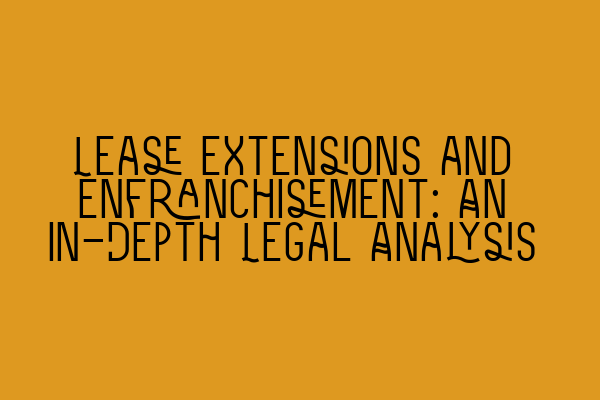Lease Extensions and Enfranchisement: An In-Depth Legal Analysis
Are you a leaseholder seeking to extend your lease or exercise your enfranchisement rights? Understanding the legal aspects involved in lease extensions and enfranchisement is crucial for both leaseholders and landlords. In this comprehensive guide, we will explore the intricacies of lease extensions and enfranchisement, providing you with the knowledge and insights to navigate these processes confidently.
Before we dive into the legal details, let’s clarify the terms “lease extension” and “enfranchisement.” A lease extension refers to the act of extending the length of a lease, typically seen in the context of residential properties. On the other hand, enfranchisement involves an individual or a group of leaseholders purchasing the freehold of their property or forming a collective enfranchisement claim. Both of these processes have their own nuances and legal requirements, which we will discuss further.
To begin, lease extensions have become increasingly relevant in recent years, particularly in areas where property prices are soaring. A leasehold property is a form of ownership that grants you the right to occupy and use the property for a fixed period, as stated in the lease agreement. As the lease term decreases, the value of the property may diminish, making it harder to secure favorable mortgage terms or sell the property at a desirable price. This is where lease extensions come into play.
The process of extending a lease can be a complex one, involving detailed legal procedures and calculations. It’s crucial to understand that lease extensions are governed by the Leasehold Reform, Housing and Urban Development Act 1993 (LRHUDA 1993) for properties where the lease term exceeds 21 years. For leases below 21 years, the process is governed by the Commonhold and Leasehold Reform Act 2002 (CLRA 2002). The legislation sets out the framework for lease extensions, including the eligibility criteria, valuation methodologies, and the rights and obligations of both parties involved.
Before embarking on a lease extension, leaseholders must ensure that they meet the necessary criteria. For example, in order to be eligible for a lease extension under the LRHUDA 1993, leaseholders must have owned the property for at least two years. There are also restrictions on eligibility based on the type of property, such as houses, flats, or maisonettes. It’s important to consult with a solicitor specializing in property law to assess your eligibility and guide you through the process.
Now, let’s discuss the valuation aspect of lease extensions. The price to be paid for a lease extension is determined through a valuation process, taking into account various factors such as the remaining lease term, the property’s market value, and the ground rent payable. The legislation provides different methods for calculating the premium, including the “marriage value,” which represents the increase in value that arises from the extension. The valuation process can be complex, and it’s advisable to seek professional advice from a qualified surveyor or valuer to ensure a fair and accurate calculation.
On the other hand, enfranchisement is a term used to describe the process of acquiring the freehold of a leasehold property. There are different forms of enfranchisement, such as leasehold enfranchisement, collective enfranchisement, and the right to manage. Each of these processes has specific criteria and requirements that must be met to exercise the right.
Collective enfranchisement is a particularly noteworthy process, as it allows leaseholders in a block of flats to club together and purchase the freehold collectively. The benefits of collective enfranchisement include taking control of the management, setting the ground rent at a token amount, and having more control over the property’s future.
Like lease extensions, enfranchisement is governed by legislation, primarily the LRHUDA 1993 and the CLRA 2002. These acts outline the eligibility criteria, valuation methods, and procedures to follow. Engaging a solicitor experienced in enfranchisement matters is vital to ensure compliance with the legal requirements and maximize the chances of a successful outcome.
Given the intricacies of lease extensions and enfranchisement, seeking professional legal advice is essential to navigate these processes effectively. A specialist property solicitor will guide you through the legal intricacies, ensuring that your rights as a leaseholder are protected and that you understand the implications and obligations of lease extensions and enfranchisement.
At SQE Property Law & Land Law, we have a team of experienced solicitors specializing in lease extensions and enfranchisement matters. Whether you are a leaseholder seeking to extend your lease or a freeholder facing an enfranchisement claim, our expert solicitors can provide you with the legal advice and representation you need. Contact us today to schedule a consultation and let us navigate the legal complexities on your behalf.
Related Articles:
– SQE 1 Practice Exam Questions
– SQE 1 Practice Mocks FLK1 FLK2
– SQE 2 Preparation Courses
– SQE 1 Preparation Courses
– SRA SQE Exam Dates
